- Home
- Dana Cameron
More Bitter Than Death
More Bitter Than Death Read online
MORE BITTER THAN DEATH
AN EMMA FIELDING MYSTERY
DANA CAMERON
For my parents,
Joyce and Al,
on the occasion of their fortieth anniversary
Contents
Chapter 1
I WAS BACK AT PENITENCE POINT. THEY SAY THAT every…
Chapter 2
THERE WAS SCATTERED APPLAUSE AND A LOT OF muttering in…
Chapter 3
I GOT BACK TO MY ROOM AND WAS IN A…
Chapter 4
THERE WAS A BLURRED BUZZING IN MY HEAD THAT wouldn’t…
Chapter 5
“THEY SAID IT LOOKED LIKE HE FELL ON THE ICE,…
Chapter 6
I GOT UPSTAIRS AND THEN WONDERED WHAT I HAD been…
Chapter 7
“CAN YOU TELL ME WHAT THIS IS ALL ABOUT?” I …
Chapter 8
IT WAS STILL SNOWING WHEN I LOOKED OUT THE WIN…
Chapter 9
CHURCH LEFT AS QUICKLY AS HE’D APPEARED, AND I decided…
Chapter 10
AS I STORMED OFF AWAY FROM THE BALLROOMS, I saw…
Chapter 11
THERE WAS SO MUCH THAT I REGRETTED IN MY LIFE…
Chapter 12
“WHAT IN GOD’S NAME WERE YOU DOING OUT there?” Church…
Chapter 13
“MARTINI, PLEASE,” SHE TOLD THE WAITER. THEN she turned back…
Chapter 14
“WHAT THE HELL IS GOING ON?” MEG SAID AFTER she…
Chapter 15
AN HOUR LATER, I WAS DRAGGING MYSELF TO MY room,…
Chapter 16
IT WAS THE PAIN THAT WOKE ME SUNDAY MORNING. The…
Chapter 17
THERE WAS THE USUAL HULLABALOO AFTER THAT, statements and all,…
Epilogue
MONDAY MORNING, I WOKE UP AT HOME, IN MY own…
Acknowledgments
About the Author
Other Books by Dana Cameron
Copyright
About the Publisher
Chapter 1
I WAS BACK AT PENITENCE POINT. THEY SAY THAT every criminal returns to the scene of the crime, and I sure felt guilty, but I wasn’t sure about what. I had a lot to choose from, at the moment.
Although we were all stamping and shivering, walking on paths that were carved out of the knee-deep early January snow, I was knocking almost everyone dead with my tour of the site. Nearly everyone had paid attention when I warned them to dress sensibly, and the good thing about the gray afternoon was that it was perfect for imagining what it must have been like here four hundred years ago when the English colonists were wondering what the hell they were doing stuck in Maine. And frankly, being on the Atlantic coast when a storm was brewing, you had to want to be there for some reason. The snow that was already on the ground damped out the ambient noise of the twenty-first century, the dull light warning of the promised storm made you pause to think about life when you couldn’t just flick a switch for light and heat, and the sound of the water brushing the beach and rolling the cobbles lent you a little of the sense of isolation that must have characterized the days of the first English settlers on this shore. I made good use of these points as I walked the group over to where we believed the buildings of Fort Providence once were, and to judge from the responses—oohs, ahhs, questions, and laughter in the right places—I was doing a great job.
This was one of my favorite things: talking about my archaeological work with my colleagues from up and down the East Coast. The conference we were all gathered for was one thing—a yearly archaeological jamboree of hundreds of kindred spirits—but actually being on the ground, at the site, in the environment, with a group of people who spoke your language, should have been sheer bliss.
What was really pissing me off was the two men who were tuned out, each in his own little world, at opposite ends of the site. The way I see it, if you’re not going to pay attention, you shouldn’t really take up someone else’s space on the bus. More than that, I couldn’t stand how childishly angry I felt with them—each for separate reasons—and struggled to focus on what was important.
I kept my talk brief and to the point, however, because the wind whipped right off the water to bite right through to the bone, no matter how many layers of wool or fleece or Gore-Tex you wore. And every time I looked over, they were the only two not paying attention. I tried funny, I tried serious replete with jargon, I tried romance and pathos. The rest of the group was right there following along with me, but no matter what I did, those two just wouldn’t react.
I hate when that happens. I hate how petulant I felt, no matter how well I was hiding it.
What do you want, guys? Archaeology not enough for you? I can do murder and mayhem, if that’s more to your taste.
Ah, to hell with them, I thought, and concentrated on the people who knew enough to pay attention, strutted and shimmied for them all the harder: archaeology as performance art. Knowing the older guy was just looking off to the water, and the younger, red-headed guy off to the right was looking around like he was waiting for a bus, impatient and bored, just gnawed at me. I had enough on my plate dealing with the past—my own personal past in this place—without them making it worse.
It was time to go.
The skies were darkening, low clouds heavy with snow as I finished off the spiel and began to herd everyone up the slope toward the bus, promising coffee and hot chocolate and a warm ride back to the conference hotel in New Hampshire. We’d been lucky so far, but the weather was looking nastier by the minute and the news had been promising a good solid storm by nightfall. I counted off the folks as they climbed on board, accepting praise from some, offers of data from others, making sure I didn’t strand anyone at the site: that would have been a little too realistic a historical reenactment for anyone’s liking. Stuck alone, miles from help, with winter’s wrath about to unload on them…Actually, it struck me as a sound punishment for some.
I felt my smile fade as the last person in the line reached me. I knew why he was last in line, the same way I knew why he hadn’t been all that interested in my talk. What I couldn’t understand was how quiet he’d been; that was unlike him. He looked just the same as I remembered from our undergraduate days. If he was a little more lined about the face, or a little more gray in his beard, the red hair and cocky attitude I knew so well was still there.
At first I didn’t think he was actually going to make eye contact, was hoping he wouldn’t, but he surprised me. Not for the first time. Damn his eyes.
“Good stuff, Em,” he said, pausing a little before he climbed into the bus.
“Thanks.” I couldn’t bring myself to say his name and coughed to cover my surprise. He didn’t look nearly as bad as I’d hoped, a little puffy—tired perhaps. But the horns and sores I’d wished on him years ago were surprisingly absent.
I fussed with the clipboard; I was still one body short. “I’ve gotta go find Garrison,” I said, nodding too briskly. I stepped back and around him, too obviously. Still not fast enough for me.
My graduate student Meg Garrity was waiting off to the side, probably for a quick postmortem of the tour and last-minute instructions. She probably saw me acting jumpy, but knew me well enough not to ask what was wrong. She herself was shuffling from side to side, which was also unlike her, but it was so cold it was probably a good idea for anyone to keep moving. Her hat, a colorful Andean woolen thing with earflaps and an improbable peak, was also well warranted. It covered all of her short, usually spiked hair and most of the piercings I knew about. There was one in her left eyebrow that I had never seen before, but I wasn’t surprised by it.
“That went well,” she said.
&nbs
p; “Yeah, I was pleased. Remind me to thank the state park people for getting the snowblower out here for the paths, would you? And thanks again for coming out early and getting the building outlines set up—I know you had to work on your presentation. I was glad that you were available. Neal was supposed to, but he’s running behind on his paper. But I don’t need to tell you that.”
“Yeah, I know.” And there came the sort of pause that, with no other warning, instantly tells you that something big is coming. “So. We got engaged over the break.”
“Hey…wow.” I felt the smile freeze on my face and my eyes widen for a split second before my better socialized superego took over and did the correct thing: I wouldn’t let my own past color her good news. “That’s fabulous! You guys are great together. Congratulations!”
“You seem…surprised.” Meg didn’t mean it in a good way; she was instantly defensive.
I rushed in to repair the damage, cursing my inability to hide my reactions, no matter how transient, no matter how outdated. Despite my own experiences, intradepartmental romances could work out, and no one could deny that Meg and Neal belonged together. “I am surprised. It’s big news, but it isn’t exactly out of the blue, is it? You guys have been living together for a couple of years.”
“No. Well, we’d talked about it, but he did surprise me.” She smiled, a little shyly, and looked impossibly young. “New Year’s Eve. It was really nice.”
And I’d have never taken Meg for a romantic. “Do you have a ring?”
“Yep.” She pulled her left mitten off—also colorful and South American—and showed me a round diamond, flanked by two smaller ones in an old-fashioned gold setting. It was very traditional and it struck me just how traditional Meg could be, though you had to look hard past her piercings and demeanor to see it. “It was his great-grandmother’s. He had the two little stones put in on either side, so it would be really mine.”
“It’s beautiful,” I said, and meant it. “Look, I want to find out all about the rest of it, but I’ve got to get this show back on the road.” The first snowflakes were starting to fly, and it looked as though it would get thick and heavy in a hurry. “Let me buy you both a drink later?”
She nodded enthusiastically. “Sure. Is everyone on the bus?”
“Nope, I’ve got to fetch Garrison.”
“Want me to?”
“No, that’s okay. I’ll get him.” No point in throwing Meg to Garrison; she had her whole professional life ahead of her and didn’t need to get on his bad side. That could have a deleterious effect.
“Okay.” She bounded back onto the bus, which was on the driveway of a house I had loved, but that was no longer there.
I paused at the top of the slope. It didn’t take me long to locate Garrison, the older man who wasn’t riveted to my talk; the site isn’t all that big, just about an acre. Trudging past the place where the wrought-iron fence had stood, it was hard to believe that just a few years ago there had been a fire that not only wiped out the big gray Victorian that had been here but killed a person I dearly loved. Now there was nothing but too many memories, too much open space, and an almost unnoticeable depression in the ground where the foundation had been. A rustic wooden shelter protecting a map and a sign describing historic Fort Providence was all that marked the site now, crowded with memories and ghosts.
Garrison had wandered over to the edge of the property, close to the nearly new fence that kept people from getting too close to the eroding cliff. He was staring out over the water, as though personally in charge of overseeing the play of the wind and the whitecaps. As I followed the unevenly plowed path, away from the main part of the site, wondering what drove him out here, the air seemed a little warmer and the wind was picking up; the weather was turning sooner than I’d hoped. He was leaning against the fence, concentrating on the horizon, and it was as though the old man was calling the storm down on himself.
The traffic was backed up as we cut across Maine into central New Hampshire—everyone seemed to be leaving work early on the threat of the incoming storm front, even though it was slated to hit inland later than the coast. We were running more than an hour late as we traveled over hilly highways past innumerable snow-covered chalet-styled resort buildings and motels that marked the approach to our destination, the General Bartlett Hotel. By the time we pulled up to the pillared front porch, still decorated with pine branches and white Christmas lights, I realized I had just enough time to take a good warm shower and get my wits together before my second big task of the ASAAs, or more formally, the Association for the Study of American Archaeology conference. After I was done with this, I just had the card game, which was something I was looking forward to, the Goody Grope, which was always amusing, and then the presentation of my paper, which, compared with the excruciating task of writing this plenary essay, would be a walk in the park.
But having to speak to the big redheaded guy by the bus out there on the site had rattled me sufficiently that it took the whole ride back to the conference hotel to get myself under control. I’d known since before the conference that he would be there, but when I first caught sight of him, it was like a body blow. The name “Duncan Thayer” hadn’t been on my list; he was a last-minute addition to the tour. Talking to him had been worse. I’d been less prepared than I imagined I would be.
The shower took a little more work than such things should. The outside of the hotel told the whole story. Once there had been a large farmhouse that evolved into a tavern that serviced travelers on the lake and the northern-running roads. After that had burned down, the original part of the hotel, which still housed the lobby and offices, had been constructed in the 1880s. The 1950s had seen a much larger addition constructed that not only extended the porch and façade but also wrapped halfway around the original inn, providing many more rooms. Although the hotel had never truly been close enough to the mountains for skiing, more recently there had been a renovation in an attempt to draw conference business.
Many of the rooms had been recently remodeled, as advertised. The plumbing, alas, had not enjoyed a completely successful upgrade. I found myself playing “raise you one” with some other unknown denizen, cranking up the hot water every time he or she turned it up, causing me to freeze. A very unsatisfactory five minutes later, I worked on drying my hair and getting ready for the plenary session paper I was to present. It took me maybe twenty minutes to get my act together, which is five minutes more than usual, but since I knew he was here, anything I could do to boost my confidence I was going to attempt, up to and including matching my bra and panties and wearing stupidly high heels, heretofore reserved for weddings and the occasional date night with my husband, Brian Chang.
I checked the clock and swore. I grabbed the sheaf of papers that comprised my presentation, checked my bag for my room key, purse, name tag, and miniature flashlight—you never could tell what the lighting situation was going to be in these places—and legged it down to the elevator. Carla was waiting there as well, for which I was glad; she and I had been part of the same conference scene since we were new graduates, and it was a relief to see her. The ends of her hair were still damp, and I wondered if she’d been the one competing for the hot water with me.
She jabbed at the elevator button repeatedly. “Come on, you no-good, useless, motherless—.”
I edged up behind her and nudged her. “Hey lady, don’t take it out on the architecture.”
“And why don’t you take a flying—” then she turned and saw it was me. We hugged warmly, briefly. “Good. Someone else with sense, here at last. Come on, we’re taking the stairs.”
I didn’t say anything about my shoes; if I was dumb enough to wear them, I was dumb enough to be macho about it too. Besides, Carla’s skirt was a good five inches shorter than mine, just shy of indecency, and if she was going to take the stairs in her rig, then so would I. Despite being a good four inches shorter, about five foot five, and twenty pounds heavier, Carla gave me a run for my mo
ney.
“You know,” I said as we found the staircase, “they can’t really start the plenary session without us.”
Carla didn’t answer but hustled down the stairs, which were dimly lit with nothing but bare utility lightbulbs that seemed to draw warmth from the space rather than add light. The dust, gum wrappers, and cigarette butts told just how often the hotel staff expected the stairs would be used: It was more of a de facto lounging area than a working exit.
We stopped abruptly at the door to the second-floor mezzanine. Carla smoothed down her skirt, adjusted her shirt, then tilted her head back so I could see straight up her nose.
“Any Buicks in the garage?”
“No Buicks, nor bats in the belfry, and neither are you in need of a hankie.”
Carla nodded thanks, then shot me a look that was a question that she wasn’t asking, yet. “Great. Let’s get ourselves to the ballroom. Thank God we only had to come down the one floor. My feet are killing me already.”
As we strode down the hallway, we passed clumps of our colleagues who called out with promises to catch up later. We paused in the ladies’ room just outside the ballroom, which we had all to ourselves. Carla hogged the mirror, trying to tame her frizzy ash-blond curls back into a respectable knot. I made a pit stop; an hour and a half can be a surprisingly long time if you’re not prepared for it, especially if you’re trapped up onstage for all the world to see.
“You know,” she said. “You know” came out more like “ooo oww;” Carla was making a mouth, messing with her lipstick. “I was looking out my hotel window this morning when I see this little red car pull up in the parking lot. Someone’s running late, I thought, then I realized: Emma’s local. She didn’t need to come until today, when things get started. Zipping around with all that panache, I couldn’t believe it was you. That can’t be Emma, I told myself, but no one could miss that red hair of yours, even from the third floor—the short hair looks cute by the way. It’s even shorter than last time, but you can carry it off. Anyway. Pretty snazzy car. Not what I picture you in, usually.”

 Hellbender (Fangborn Book 3)
Hellbender (Fangborn Book 3) Hellbender (The Fangborn Series Book 3)
Hellbender (The Fangborn Series Book 3) Hellbender
Hellbender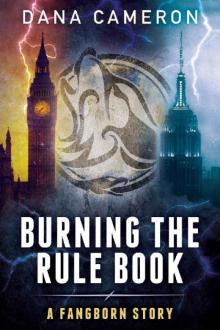 Burning the Rule Book
Burning the Rule Book Site Unseen
Site Unseen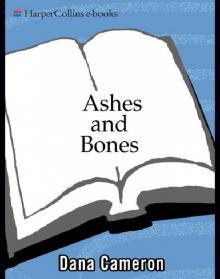 Ashes and Bones
Ashes and Bones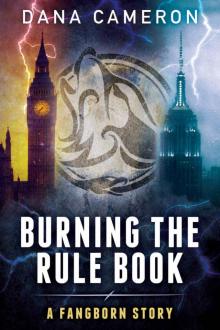 Burning the Rule Book (A Fangborn Story 3)
Burning the Rule Book (A Fangborn Story 3)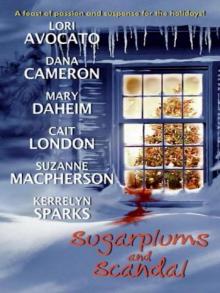 Sugarplums and Scandal
Sugarplums and Scandal The Curious Case of Miss Amelia Vernet
The Curious Case of Miss Amelia Vernet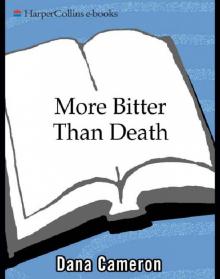 More Bitter Than Death
More Bitter Than Death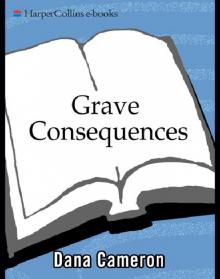 Grave Consequences
Grave Consequences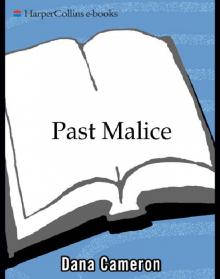 Past Malice
Past Malice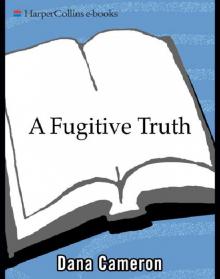 A Fugitive Truth
A Fugitive Truth Seven Kinds of Hell
Seven Kinds of Hell